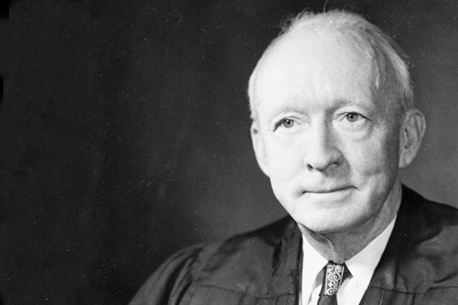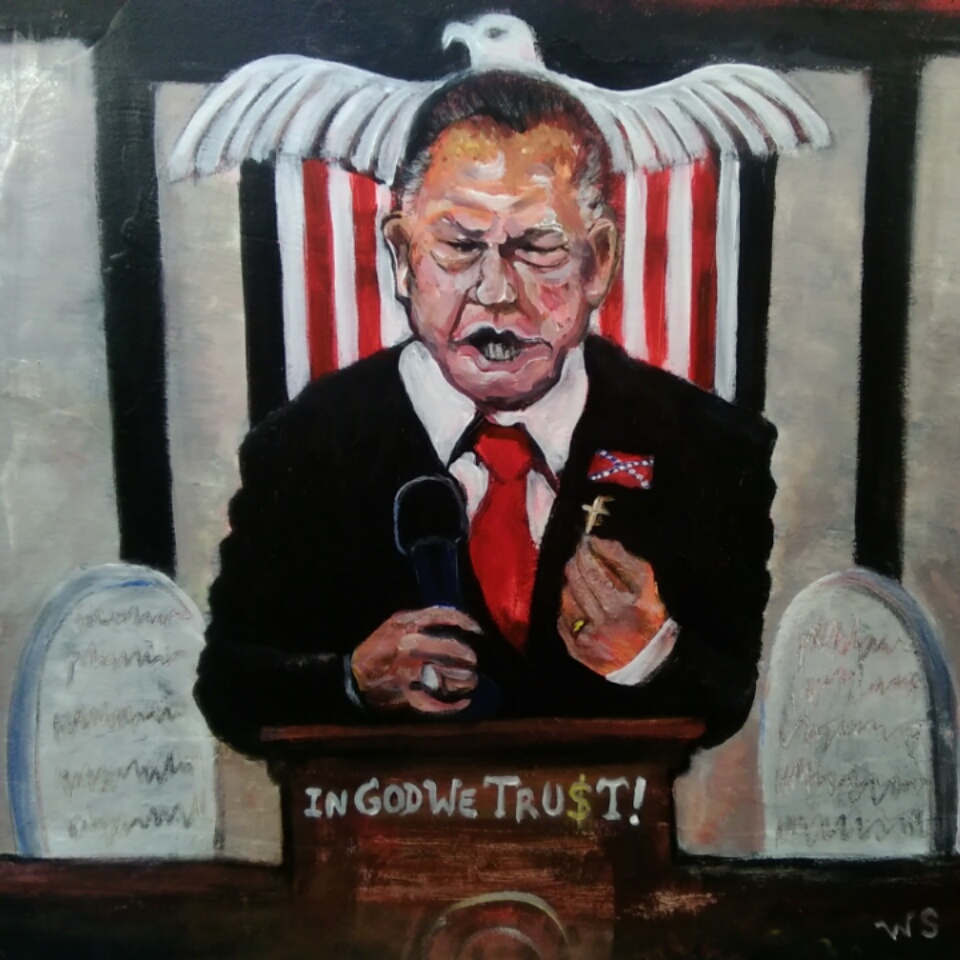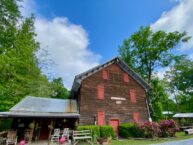
By Roger Newman –
Exclusive to the New American Journal –
“Alabama has a history of great senators,†said the greatest of them all. Not even Lister Hill’s exceptional accomplishments in expanding hospital care, medical research, libraries and education, or John J. Sparkman’s in housing and establishing rocketry in the state, could compare to those of Hugo L. Black.
Within a few years, during the New Deal in the 1930s, he packed in a lifetime of achievements. He was the most feared congressional investigator of the day. His probe into lobbying irregularities by public utilities was instrumental in the passage of the Public Utilities Holding Company Act (1935), and his inquiry into airline and shipping subsidies led to the Merchant Marine Act (1936) and ultimately to the establishment of the Civil Aeronautics Board.
The last bill he introduced was for a study of national health insurance, and he intended to use its results to draft a comprehensive measure. His pet project was a federal minimum wage. Black introduced the bill three times before it became law in 1938.
And throughout, he read and read and read.
The year before, Franklin D. Roosevelt appointed him to the Supreme Court. There Black led the redirection of American law toward the protection of the individual. He clothed complicated concepts in direct, succinct, almost simple language that had a biblical cadence. Language and history, he wrote, are the “crucial factors†in interpreting the Constitution.
He had a spacious canvas to work on. The formation of the American republic created a new epoch in history. The role of the citizen and his relationship to the state were reformulated. Few things were more novel than the Bill of Rights.
The Framers knew the dangers when ecclesiastical rulers try to control people’s minds. They designed a document which enabled the government to function in its sphere yet gave the true rulers, the people, sovereignty over their own beliefs. The Bill of Rights remains the lodestar of American liberty.
“Congress shall make no law respecting an establishment of religion, or prohibiting the free exercise thereof…†So begins the First Amendment, even before it protects freedom of speech and press. Despite the difficulty of applying these majestic phrases, they have largely assured their primary goal – assuring separation of church and state in a religiously pluralistic nation.
Thomas Jefferson, whose animating spirit was everywhere, and James Madison, who was the Bill of Rights’ chief draftsman, were both religious men. By religious I do not mean in the church-going sense, but that religious concerns animated them. Jefferson’s secularism was more anticlerical than atheistic, and varied between theism and deism. And Madison came close to taking the cloth in his youth
Both drew on Roger Williams. The roots of religious liberty in America, and one of its most enduring images as well, can be traced to Williams. In the seventeenth century he spoke of “a gap in the hedge or wall of separation between the garden of the church and the wilderness of the world.â€
The two most important religious cases decided by the Supreme Court both drew on this teaching. Justice Black wrote both opinions – a religious school bus case in 1947 and the school prayer case in 1962. He knew the Bible well since his childhood in Clay County, Alabama, and for 15 years starting in the early 1910s he taught a weekly Baraca class at Birmingham’s First Baptist Church. As many as 1000 men attended, giving him wide local visibility.
“He used international Sunday school lessons,” recalled a class member. “He was a good, alert, concise teacher. He used illustrations from the Bible to make his point. He was a Bible scholar.”
He tied the mundane — “no drinking or womanizing; he didn’t want that,” another member said — with the theoretical, and made his interpretations with the same passionate conviction that he used to sway juries: in 1914 he was elected Jefferson County solicitor (or district attorney), and after World War One he was Birmingham’s leading trial lawyer.
“Religion,” Hugo told the students:
is a vital part of the warp and woof of our national existence. Its glowing burning truths inspired the hearts of American pioneers. Its sacred precepts established our home life; shaped our infant institutions and nourished a spirit of equality and democracy. The voice of Roger Williams and his followers played no small part in impressing the principles and policies that molded our institutions and crystallized our sentiments into written Constitution and laws. The Bible penetrated the trackless forests with the pioneers and strengthened the sturdy character of our early settlers. In the name of Religion and Freedom of Religion laws were resisted to cross a tempestuous ocean to an unknown land.
Our country has grown great, wealthy and prosperous beyond the wildest dreams of avarice, under a government instituted by readers and lovers of the Bible. Today, there are those who say that no longer do we need religion; no longer is the Bible essential. Like an ungrateful and overgrown child, we are urged by some to renounce the old-time religion to which many attribute the stability of our institutions and therefore the cause of our greatness. With the pride and boastfulness of the Prodigal Son, we are asked to leave the safety of our Father’s House to wander in search of Happiness and glory into distant lands and other climes.
The laymen of the church can contribute to the furtherance of religious zeal and devotion and to the departure of our people from their old ideals.
A preacher without a cloth, he admonished his listeners to keep faith, remain optimistic and work hard, for then they could reap the inevitable rewards of the Promised Land. And they left his sessions to go out and “do good.”
In 1947 Black, writing for the court, upheld a local New Jersey law that authorized reimbursement of money spent by parents for sending their children to religious school on public buses. The essence of his opinion in Everson v. Board of Education was that prohibiting repayment would have deprived a benefit extended for the safety and convenience of all children regardless of religion. The law’s objective was secular and therefore this kind of “aid†was not forbidden.
Black wrote: “The ‘establishment of religion’ clause of the First Amendment means at least this: Neither the state nor the Federal Government can set up a church. Neither can pass laws which aid one religion, aid all religions, or prefer one religion over another. In the words of Jefferson,†in an 1802 letter to the Danbury, Connecticut Baptists, the radicals of their day who felt their rights were being violated but who were reflecting the views of their religious forebears, “the clause against the establishment of religion by law was intended to erect a ‘wall of separation between church and state.’ … That wall must be kept high and impregnable.†His holding contrasted sharply with his rhetoric, but he left the dissenters little room in which to maneuver.
“They’ll see it was a Pyrrhic victory,†he said at the time.
In the late 1950’s five parents of children attending a New Hyde Park, New York public school charged that a state-composed prayer recited at the start of each school day violated the Establishment Clause. The prayer was: “Almighty God, we acknowledge our dependence upon Thee, and we beg Thy blessings upon us, our parents, our teachers and our Country.â€
Black longed to hear it but feared the court would decide it wrong.
“I want to know what these guys do before I vote to take it,” he said even before they decided to hear it. The seven to two vote relieved him. Then he worked himself up before the court’s April 6, 1962 conference to discuss the case. To him it went to the whole purpose of why we fought a revolution and have a written constitution protecting our rights. The prayer patently violated the First Amendment, he told his colleagues. All seven other justices sitting agreed, except for Potter Stewart who passed and was eventually the only dissenter. Black was assigned to write the Court’s opinion.
He had long since drifted away from organized religion and by this time was formally irreligious. Even though he never quite felt there was an hereafter, he sometimes went to services at the All Souls Unitarian church. Its minister was his “closest connection to God,” he said. In 1964 he contributed $100 to All Souls “to be used in such of its activities as it sees fit. It is a pleasure to be able to do this.” Soon he said, “I can’t exactly believe and I can’t exactly not believe.”
Black’s belief in man’s unending struggle against the perversities of his own nature, which only one’s will could overcome, strongly resembled modern Christian realism. He was imbued with Protestantism’s individualistic character, and he viewed his main task as a Supreme Court justice as protecting the people’s impulses from state compulsion in any form.
That was his goal in writing the opinion in Engel v. Vitale. But first he read, starting with the Book of Common Prayer and John Bunyan, both of which he reread, along with other works in his substantial home library.
“He had religious references on his fingertips,” recalled his clerk. “He told me to go to the library to get more. He landed up reading everything I took out,” dozens of books and articles in all. “People had been tortured, their ears lopped off, and sometimes their tongues cut or their eyes gouged out, all in the name of religion,†he said before putting a word on paper. “He advocated many religions of a diverse nature, because, as he said, when one religion gets predominance, they immediately try to suppress others.”
That was what he feared about the Roman Catholic Church.
After a few weeks, Black felt ready to dictate a draft declaring that the regents’ prayer violated the First Amendment’s establishment clause based on the court’s past decisions, and he added some historical observations to round things out. He wrote seven drafts, combining history and legal analysis. Then in his last draft he removed nearly all of the analysis, not citing one substantive case in support of his position. The opinion as published, except for the statement of facts, became almost completely an essay on the history of church-state relations in England and America. He aimed to lessen the inevitable controversy he knew would ensue. Those who disagreed were left no openings. They could object only to his history.
There can be “no doubt,†Justice Black wrote, “that [the] daily invocation of God’s blessings … is a religious activity. … It is no part of the business of government to compose official prayers for any group of the American people to recite as a part of a religious program carried on by the government.â€
He turned to the sixteenth, seventeenth and eighteenth centuries, and especially to the calamitous efforts, culminating in the Act of Uniformity (1548), to make the Book of Common Prayer the standard of English religious observance. He wrote about the spillover of this unfortunate exercise in the American colonies. The framers, he concluded, intended to prohibit all establishments of religion like the regents’ prayer program: there can be “no doubt that [the] daily invocation of God’s blessings … is a religious activity. … It is no part of the business of government to compose official prayers for any group of the American people to recite as a part of a religious program carried on by the government.” Religion, he concluded, “is too personal, too sacred, too holy to permit its ‘unhallowed perversion’ by a civil magistrate.â€
When delivering the opinion, he leaned forward, resting his arms on the bench, and read with considerable emotion. He gave a brief resume of the case, then paused, grasped his paper more firmly and, “his voice deeper and with the faintest tremble” (noted one reporter) said that New York had “adopted a practice wholly inconsistent with the Establishment clause.”
No one who heard Black could doubt his sincerity. The First Amendment, he continued, expressed the framers’ belief that religion “is too personal, too sacred, too holy to permit its ‘unhallowed perversion’ by a civil magistrate.” Again, “his voice trembled with emotion,” wrote one observer, “as he paused over ‘too personal, too sacred, too holy.'” He pointed out it did not mean that songs with the word “God” could not be sung. And he added extemporaneously and with emotion in his voice, “The prayer of each man from his soul must be his and his alone.”
He barely returned to his chambers than the phone started ringing without a stop and he received more than one thousand letters, and the Court more than five thousand, about the opinion, more than about any prior one in its history – this long before interest groups started generating them by the tens of thousands. It was the first salvo in the culture wars and both surprised and pained the justices. Former presidents Hoover and Eisenhower, Catholic prelates and many Protestant ministers blasted the court. Like most of the critics, they did not read the opinion.
The American Bar Association (ABA) president, an admitted segregationist, concluded that its rationale made the words “In God We Trust” on coins illegal. “They put the Negroes in the schools and now they’ve driven God out,” said Alabama congressman George Andrews.
President Kennedy’s quick and strong support – “we have a very easy remedy and that is to pray ourselves†– defused some of this vitriol, but fifty-odd bills to overturn the decision were nevertheless introduced in the House of Representatives; all went nowhere. And that summer, Justice Tom Clark, an active Presbyterian layman, departed from tradition to defend the court. The Constitution, he told the ABA, provides “that both state and federal governments shall take no part respecting the establishment of religion or prohibiting the free exercise thereof. ‘No’ Means ‘No.’ That was all the Court decided.â€
Upon reading this, Justice Black, who had so often used the phrase about freedom of speech and press, had to chuckle.
Black answered the “nice” letters he received, especially from Alabamians. (One exception came from a woman who condemned him to hell, without a hearing he said. If she would go to the library, as he was sure she did not have it in her house, and ask for a book called the Bible, he replied, she could read where it said “Pray in your own closet.”)
Reading the letters was a “real education,” he thought. Many people wrote to say they changed their minds about the decision once they read it, which was often after he sent it to them. While most letters coming from Protestants were approving, “the biggest percentage of group approval have come from Baptists, Jews and Quakers. These letters indicate to me that it would practically require a miracle to secure a vote by the people of the United States favorable to changing the First Amendment.â€
He was especially proud of approving Baptists: they “have more reasons than some others to appreciate the great virtues of the First Amendment,” he wrote one Birmingham minister. But only the intervention of his old political friend Harwell Davis who had been president of Howard College (soon renamed Samford University) saved him from further criticism.
“Don’t come down too hard on Black. He’s a good guy,” Davis told several Birmingham preachers; and they did not. To another Alabamian Black wrote, “your news mediums are confined to a local area” and “you might be greatly helped by reading what is being said in other parts of the world.”
Several correspondents were undoubtedly surprised by his suggesting they read various parts of the Bible. He was convinced that people whom he knew did not want any politician to tell them how to pray. He recalled the days in the Odd Fellow Lodge at Birmingham: “I remember that prayers were regularly offered, not because the State commanded it but because the members of the Lodge wanted to engage in that service.”
A letter to his niece three days after this most controversial decision Black ever wrote summed up his feelings:
The basic premise of the First Amendment is that people must be left to say their prayers in their own way, and to their own God, without express or explicit coercion from any political office holder. There are not many people with religion and intelligence who will think this constitutional principle wrong on mature second thought. To those who think prayer must be recited parrot-like in public places in order to be effective, the sixth chapter of Matthew, 1 to 19, might be reflected upon, particularly verses 5 through 8. [“But when you pray, go into a room by yourself, shut the door, and pray to your Father who is there in the secret place….â€]
The next year, 1963, the Court invalidated Bible reading and reciting the Lord’s Prayer in public schools. The sole dissenter again was Justice Stewart. A few days later, Justice Byron White took part in a swearing in ceremony at the Department of Justice.
“I had to borrow this Bible,” he said. “The only one left in the Supreme Court was Potter Stewart’s.”
In May 1964, 70 Baptist ministers, concerned about the Court’s religious opinions, visited Black at the Court. They sat on the floor of the conference room, questioning him and telling him about the enmity some of their congregants felt toward the Court. He hoped people would not lose their religious convictions for religious people conceived the Constitution, he replied. Educate your people, but basically “just let ’em talk.”
In these two decisions the Court made Jefferson’s metaphor of the “wall of separation between church and state†into a principle of American law. But then Justice Black privately admitted that he now believed he had been wrong in the school bus case. For a man who rarely admitted of doubt, well, you might as well have an advocate of creation science admitting that the theory of evolution was valid after all.
Black told his misgivings in 1966 to James McCollum. In a 1948 case McCollum’s mother had brought on his behalf Black also wrote the court’s opinion, striking down a local Illinois law releasing public school students from classes to attend religious instruction in public classrooms. Now he said that he thought that the idea that government aid goes to the children attending religious schools and not to the schools themselves, the child benefit theory, goes too far. He regretted his vote in the school bus case. Public money should not be used to transport students to parochial schools.
First Amendment clashes are basically cultural clashes. But having known people who feel that because they have seen the divine light government should make others see it too, along with a simple respect for others, should continually be on the conscience of every public official in a democracy. The First Amendment’s mission is to free the minds and spirit of individuals from governmental intrusion.
Yes, the First Congress opened each day’s session with a Christian prayer invoking God, and Congress still does. Invocations of Divine blessing and other religious references have always regularly run through familiar government activities. Our coins say “in God we trust,†and the crier in the Supreme Court intones, “God save the United States and this honorable Court.†Such ceremonial references have long been an accepted part of our public life. But it is an ancient maxim that the law is not concerned with trifles.
Anything more simply becomes a political football with the strongest group getting its way. Today’s majority can always become tomorrow’s minority. We should not forget what happened in a small Oregon county in 1977.
“Moonies,†followers of the Reverend Sun Myung Moon, bought a huge plot of land and almost took over the county. If they had gained a majority of the school board, they could have written their beliefs into a prayer that all children attending public schools had to recite. What would the good Christian parents have then said?
Under the Constitution civil government has no power over the realm of conscience. One person’s devotion is another’s reverence. The United States is the most religiously diverse nation in the world with over one thousand different religious bodies and sections; upwards of one hundred have more than fifty thousand members each; and there are seventy-five varieties of Baptists alone. The fastest growing religious group today is Islam. How in heaven’s name, if I may, can a public policy about, say, religion in the public square, governmental aid to any religion in any aspect or, to pick a topic at random, sexual preferences in private be devised which all will accept?
At issue is the duty some people feel they owe their Creator. Those who wish to blend government and religion ignore the simple fact that the rights of conscience thrive best when left alone.
“No holding by this Court suggests that a school can persuade or compel a student to participate in a religious exercise,†Justice Anthony Kennedy wrote in a 1992 case, nodding at Justice Black, and not even Justice Antonin Scalia in dissent could disagree. The First Amendment was devised precisely to save us from official attempts to fix any prescribed orthodoxy. Pious people do not require Caesar’s helping hand to serve God.
Over the past generation advocates of school prayer and the centrality of the Bible, and religion in general in public life, want to restore “traditional,†essentially pre-World War Two, moral values and bring back “the good old days.†The problem with this most sincere effort is that the Constitution, which they profess to revere, and the Bill of Rights, which they do not talk about much, created a government and institutions without religion. The framers created a “godless constitution,†an intentionally secular base on which religion could privately thrive. They knew that separation advantages both entities: the state, for which it is a source of strength; and the church, which has the freedom to operate independently. A congregant’s confidence in his church’s autonomy, his pride in its sovereignty, his trust in its self-sustaining efficiency, are all affirmed. As Justice Black wrote in the school prayer case, “a union of government and religion tends to destroy government and degrade religion.â€
This is when the Supreme Court, led as it was by an Alabamian as it was for most of Black’s tenure, did it right – did it the constitutional way. The phrase “wall of separation between Church and State†continues to define the popular meaning of the establishment clause and, given both appointment patterns and the influence of the conservative movement, increasingly less of the Supreme Court’s rulings. There are two major viewpoints about the meaning and interpretation of the clause:
Separationism holds that the establishment clause prevents any government endorsement or support of religious establishment. Generally speaking, this broad view has been the majority stance on the court since Black’s 1947 opinion. Justices Ruth Bader Ginsburg, Stephen Breyer, Sonia Sotomayor and Elena Kagan support it. Conservatives, however, have charged that it encourages hostility to religion, and it has been weakened in the area of challenges to governmental funding of religion.
Non-preferentialism (or accommodation) holds that the government may support or endorse religious establishments as long as it treats all religions equally and does not show preferential treatment. Nor may government establish a single national church or coerce religious choices. It hinges on the belief that the free exercise clause is preferment to the establishment clause. Chief Justice John Roberts, Jr., Samuel Alito, Jr. and, likely, Neil Gorsuch back this view while Anthony Kennedy swings between it and separationism.
There is also Preferentialism (or Christian denominationism which holds that the establishment clause only prevents the government from creating a church and does not prevent the government from exilically endorsing Christianity. Moore and the Rev. Pat Robertson hold this view, and Justice Clarence Thomas seemingly believes that this interpretation applies to state, but not federal, law.
If Roy Moore is elected to the Senate and is true to his beliefs, he likely would not vote to confirm to the Supreme Court any nominee over at least the past seventy-five years except for Thomas. This is perhaps the most important thing at stake in the election.
Moore is building on a religious movement that stopped its ways almost in its tracks. For generations evangelicalism stood for improving the public lot. Then, in the turmoil of the late 1960s and continuing through the 1970s the Baptist church largely did away with training unions which trained membership in Christian living and Baptist doctrine and history, including the importance of the separation of church, and also with preachers who undertook it themselves and preached it to their congregations. No longer were there a division within churches on class lines. Churches became increasingly polarized as culture war issues took over.
Call him a fraud, a phony, an imposter, a charlatan, a con man – you might even say that as presented he is “fake news.†That is all emphatically true. But make no mistake: Moore wants to take away your rights.
Put aside – even though I realize it’s impossible – the differences in character and intellect as well as everything else – between him and Hugo Black, the charges that abound and, as I write, keep on coming against Moore, and consider what he has said, that judges who put themselves above the constitution, claiming that they are the servant of a higher power, should be impeached. I suppose this would include all judges who have not supported school prayer and who have supported same sex marriages and “new rights†created in 1965, by which he meant, without mentioning it, the constitutional right to privacy.
That is an awful lot of judges and would not leave the Senate much time for anything else. Ignorance has always been a demagogue’s best friend.
—
Roger Newman is the author of Hugo Black: A Biography and the editor-in-chief of The Constitution And Its Amendments.














